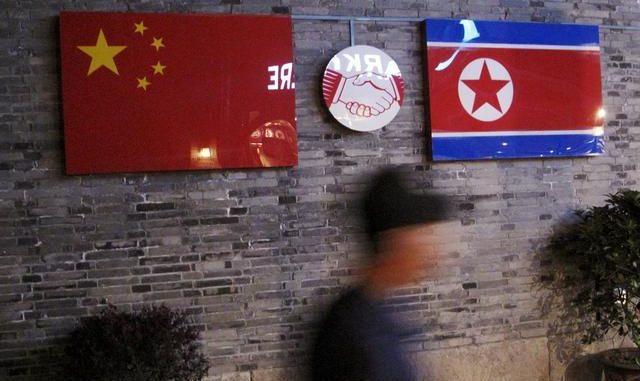
An investigation by South Korea’s human rights watchdog found no evidence the country’s spy agency tricked or coerced a dozen North Korean restaurant workers into defecting in 2016, as some have alleged, documents reviewed by Reuters showed on Tuesday.FILE PHOTO: Flags of China and North Korea are seen outside the closed Ryugyong Korean Restaurant in Ningbo, Zhejiang province, China, in this April 12, 2016 file photo. REUTERS/Joseph Campbell/File Photo
Lawyers for some of the women said they would seek to challenge the findings in court, setting up a potential legal fight over a saga that has complicated efforts to improve relations between the two Koreas.
The group’s defection was one of the largest known cases of its kind, and the South Korean government’s decision to publicize it broke with long-held practice that it does not identify defectors on safety and privacy grounds.
Since last year the National Human Rights Commission of Korea has been investigating whether the 12 waitresses had wanted come to the South, after at least three of them said they were pressured by South Korean intelligence agents.
The 12 had worked at a North Korean restaurant in China, and arrived with their restaurant manager in the South via Malaysia in April 2016. Pyongyang said they were abducted, while Seoul has said the workers defected of their own free will.
The commission has not released the results of its probe, which included interviews with five waitresses and the manager, as well as government and intelligence officials. But it shared its findings for the first time with a group of activist lawyers who raised a petition on behalf of some of the women in 2017.
The Unification Ministry, in charge of inter-Korean affairs, said in a statement that it would take steps to improve defectors’ rights in line with recommendations from the commission contained in the report, which urged the ministry to adhere to its rule of protecting defectors’ identities.
The commission said it could not confirm that South Korean authorities had coerced the North Koreans into defecting because of inconsistencies in the testimony of the manager, according to the 42-page document sent to the group on Monday and seen by Reuters.
It also cited the disappearance of what may have been key evidence, such as emails or call logs of a military intelligence agent who destroyed his mobile phone.
However, the watchdog found the government breached the law and the workers’ rights by publicizing their defection.
Lawyers for a Democratic Society, better known as Minbyun, initiated the case after meeting with some of the waitresses and criticized the findings, vowing to take the case to court.
“They jumped to a self-contradictory conclusion which was either deliberate or just incompetent,” said Jang Kyung-wook, one of the lawyers.
The women are seeking a chance to reunite with their families left behind in the North, or at least greater freedom in the South, where they say they live under close watch by the authorities which limits their activities and movement.
Cha Seung-ryul, an investigator at the commission, declined to comment on the lawyers’ criticisms. He told Reuters it was unlikely that there would be any public announcement of the result of the probe, but said that prosecutors were expected to conduct an investigation as necessary.
Reporting by Hyonhee Shin; Editing by Alex Richardson
SEOUL (Reuters) –
